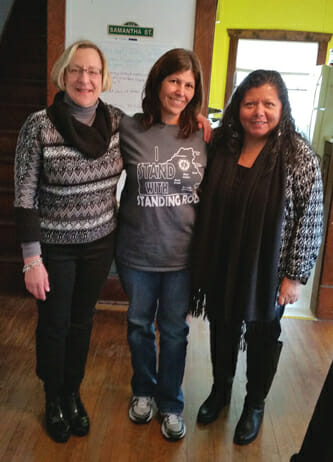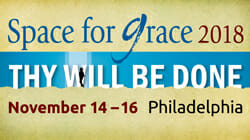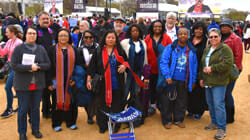ABHMS staff member extends ministry beyond job

Peterman, Sabers and Barrueto at Sabers’ home in Aberdeen, S.D.
For staff members at American Baptist Home Mission Societies (ABHMS), ministry often transcends official duties. Take, for example, Sue Peterman, administrative assistant in the organization’s Valley Forge, Pa.-based Communications department. Her own personal initiative resulted in a connection with Samantha Sabers, who, at the time, was an inmate at South Dakota’s Women’s Prison, Pierre. Here, Peterman shares how the relationship was established and how it has grown into a healthy, mutually beneficial friendship of 17 years.
Q.: How and when did you first connect with Samantha?
A.: In April 2000, Susan Gillies, former interim general secretary of American Baptist Churches USA—who was, at the time, deputy executive director of ABHMS—and the Rev. Dr. Cheryl Dudley, executive minister of American Baptist Churches of Metropolitan New York—who was then ABHMS associate executive director of Home Mission Development—invited me to travel with them to South Dakota to witness a Palm Sunday baptism service at the Church of Hope in the women’s prison in Pierre. Seventeen women were baptized. I was touched by the women being baptized but heartbroken because prison rules forbade them to embrace each other afterward. I asked the Rev. Michelle Bradley, who was the prison’s chaplain at the time, if there was someone who would be interested in corresponding.
Q.: Why did you want to connect with an inmate?
A.: I wanted to correspond because Michelle had said that the women don’t get a lot of visits or human contact because sometimes their families live far away from the prison. I just felt it would be a good thing if I could connect with one of the women.
Q.: What can you tell readers about Samantha?
A.: She was incarcerated for 15 1/2 years, from 1987 to 2003. She is now 52 years old. Her mother was American Indian and her dad Caucasian; Samantha’s paternal grandfather disapproved of the marriage. While in prison, Samantha accepted Jesus and became a Christian. She also tutored a computer class, led Bible study and learned to play guitar and violin. She worked as a clerk for Michelle and would help to set up before and clean up after worship.
Q.: How did your relationship develop?
A.: About a month after my visit to the prison, I received my first letter from Samantha. The first few sentence said, “You probably don’t remember me, but I was at the church service here that you attended. I’m not sure, but I think I was sitting in front of you. I was the one with the blue smock.” Samantha drew a smiley face after the sentence to show that she was joking; all of the inmates had been wearing blue smocks. We began writing sporadically. She would tell me about what she did in prison; I’d tell her about my family. I usually phone her at Christmas and occasionally throughout the year.
Q.: Have you spent time together in person?
A.: I had connected Samantha with the Rev. Fela Barrueto, ABHMS national coordinator of Prisoner Re-entry and Aftercare Ministries. In November 2015, Fela invited Samantha to attend ABHMS’ Space for Grace in Los Angeles to meet the Prisoner Re-entry team. So Samantha and I met for the first time at Space for Grace. We just hugged. It was so nice to see her after corresponding for 15 years. Then, this past March, Fela attended a meeting at Church of Hope and invited me to go along. We drove two hours from Pierre to visit Samantha at her home in Aberdeen. Since Samantha’s daughter and three of Samantha’s four grandsons have moved in with her, I was able to meet two of her grandsons.
Q.: Where is Samantha now, and what does she do?
A.: She is a machine operator who makes furnace filters at 3M. At the end of August, she completed one year there. She recently told me by text, “That also means it will be one year that I’m off Welfare!” Although I hear that it’s difficult for returning citizens to get work, Samantha has managed to work consistently since her release.
Q.: How is this relationship mutually beneficial?
A.: She encourages me because she has overcome so much and has a positive attitude. She encounters closed doors at every turn because she has a “record.” That is, unfortunately, never going to go away for her. I wish I could talk to and see her more. I hope in some small way that I can help her and be there if she needs to talk.
Q.: What are your hopes for her future and your friendship?
A.: My hope is that we will always be friends and that we can get together in person more often. I want her to succeed and have joy in her life.
Q.: What is your advice to someone else who may want to reach out to another but is holding back?
A.: If I can be of support to someone—even if it’s just by writing, emailing, calling—isn’t that what life’s about—to be there for someone? You don’t need money to write a letter, send a text, call a person. It’s just being there, listening and supporting. I’m grateful for having Samantha because, with everything she’s been through, I think, “Why am I complaining about my life?”
Read more about ABHMS’ Prisoner Re-entry and Aftercare Ministries.






